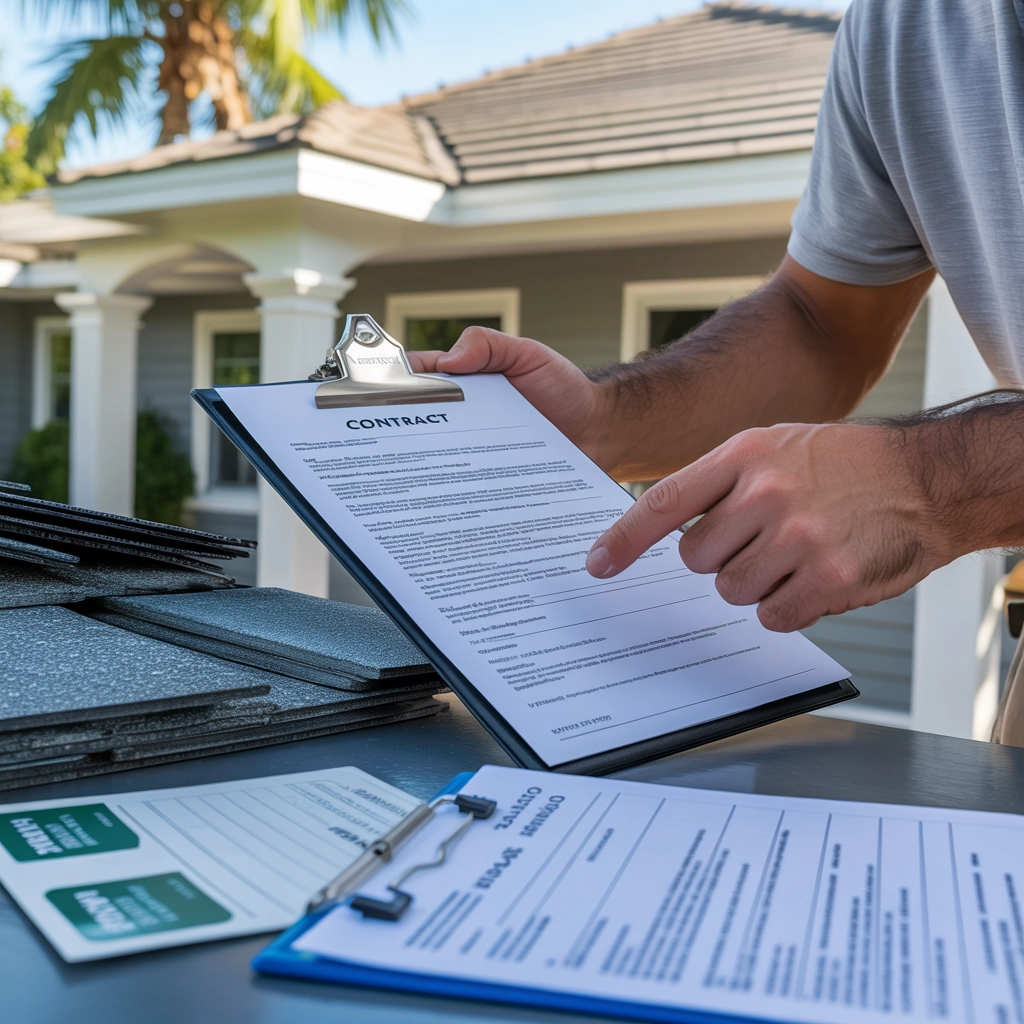As a Florida homeowner, your roof isn't just another part of your house—it's your first line of defense against the Sunshine State's extreme weather conditions. With hurricanes, intense heat, heavy rainfall, and high humidity, Florida roofs take a beating year after year.
To address ongoing challenges in the roofing industry and better protect homeowners, Florida has introduced several new roofing laws for 2025. These changes affect everything from insurance coverage to contractor requirements and consumer protections.
Let's break down what these changes mean for you and how to stay ahead of the game.
The Big Picture: Florida's Roofing Landscape in 2025
Florida's roofing regulations have evolved significantly in response to climate challenges, insurance industry concerns, and consumer protection needs. The 2025 updates represent the most comprehensive overhaul in years, targeting longstanding issues that have affected homeowners across the state.
These new regulations aim to:
- Create more transparency between homeowners, contractors, and insurance companies
- Reduce fraudulent claims and poor workmanship
- Extend roof lifespans through better maintenance
- Protect consumers from predatory contracting practices
- Improve the overall quality and resilience of Florida's housing infrastructure

Insurance Changes: Age Matters More Than Ever
One of the most significant changes affects how insurance companies handle roof claims. Under the new laws, insurance providers have gained broader authority to deny full roof replacement claims based on roof age.
What You Need to Know:
- Age-Based Coverage: Insurance companies can now more easily deny full replacement coverage for roofs that are typically 10-15+ years old.
- Depreciation Schedule: Many policies now include a depreciation schedule for roofs, meaning older roofs receive less coverage regardless of condition.
- Maintenance Documentation: Insurance companies can require proof of regular maintenance and inspections to approve claims.
- Partial Coverage Options: Some insurers now offer "actual cash value" rather than replacement coverage for older roofs, leaving homeowners to pay the difference.
Ron Swansea, a senior claims adjuster at a major Florida insurance provider, explains: "The days of getting a complete roof replacement for minor damage are largely behind us. The new regulations allow us to assess roof age and maintenance history much more thoroughly before approving full replacements."
What This Means for Homeowners:
Regular roof inspections and maintenance are no longer optional if you want to maintain your insurance coverage. Documentation of all roof work becomes essential for supporting future claims. Consider:
- Scheduling professional roof inspections at least once a year
- Documenting all maintenance and repairs with photos and receipts
- Addressing minor issues before they become major problems
- Understanding the specifics of your policy's roof coverage
New Contract and Documentation Requirements
The 2025 laws have substantially increased the documentation requirements for roofing projects. These changes aim to reduce disputes and ensure homeowners are fully informed before work begins.
Required Contract Elements:
- Detailed Scope: Specific description of all work to be performed
- Materials List: Comprehensive inventory of all materials to be used
- Timeline: Clear start and end dates for the project
- Payment Schedule: Detailed breakdown of payment milestones
- Warranty Information: Specific warranty terms for both materials and labor
- Insurance Verification Notice: A statement advising homeowners to check their insurance coverage before signing
Additional Documentation Requirements:
- Proof of contractor licensing
- Proof of worker's compensation and liability insurance
- Copies of all necessary permits
- Written warranty documentation
- Pre-work inspection reports
- Post-work completion certificates
Angelo Ponce from APC Roofing emphasizes, "The documentation requirements may seem excessive, but they actually protect both parties. Clear contracts mean fewer disputes and better outcomes for everyone involved."

Consumer Protections Under House Bill 715
House Bill 715 introduces several significant consumer protection measures specifically designed to protect homeowners from fraudulent or predatory roofing practices.
Cancellation Rights:
- Standard Cancellation: Homeowners can cancel contracts within 10 days of signing or the project start date (whichever comes first) without penalty.
- Emergency-Related Cancellation: Residents in state-declared emergency areas can cancel roofing contracts within 180 days of the emergency declaration.
- Required Notifications: Contractors must clearly disclose these cancellation rights in all contracts.
Additional Protections:
- Anti-Solicitation Measures: Stricter regulations on door-to-door roofing sales
- Insurance Claim Handling: New limits on how contractors can interact with insurance companies
- Assignment of Benefits (AOB) Restrictions: Continued tightening of AOB practices to prevent abuse
Expanded Contractor Scope:
House Bill 715 also allows licensed roofing contractors to evaluate and enhance roof-to-wall connections in structures with wood decking. This provision enables roofers to perform more comprehensive storm protection work, provided it meets building code requirements or certified engineering standards.
State Senator Maria Alvarez, who sponsored the bill, noted, "These protections give homeowners more time to make informed decisions, especially during the chaotic aftermath of a storm when they're most vulnerable to high-pressure sales tactics."
Contractor Licensing and Requirements
Florida has always had strict contractor licensing requirements, but the 2025 laws take these a step further.
Key Changes for Contractors:
- Enhanced Background Checks: More thorough vetting of contractor applicants
- Continuing Education: Increased requirements for ongoing education about building codes and best practices
- Local Knowledge Testing: Additional testing on regional building requirements and climate considerations
- Digital Documentation: New requirements for maintaining digital records of all projects
Why This Matters for Homeowners:
Always verify that your roofing contractor holds a valid Florida license. The state's Department of Business and Professional Regulation offers an online verification system.
Working with an unlicensed contractor not only risks poor workmanship but can also:
- Void your home insurance policy
- Create liability issues if workers are injured
- Result in permits being denied
- Leave you with no recourse if problems arise
At TCI Roofing and Solar, we maintain all required licensing and stay current with continuing education requirements to ensure we're always in compliance with Florida's latest regulations.
Material Requirements and Building Code Updates
The 2025 regulations also include updates to material requirements, reflecting Florida's ongoing efforts to improve resilience against severe weather.
Notable Updates:
- Wind Resistance: Higher wind resistance requirements for roofing materials, especially in coastal areas
- Solar Reflectivity: New standards for solar reflectivity to reduce heat absorption and energy costs
- Sustainability: Incentives for using environmentally friendly roofing materials
- Installation Methods: Updated requirements for installation techniques to improve durability
Popular Compliant Options:
- Impact-Resistant Shingles: Designed to withstand hail and wind-blown debris
- Solar-Reflective Tiles: Reflect sunlight to keep homes cooler
- Metal Roofing Systems: Offering excellent durability and wind resistance
- Integrated Solar Roofing: Combining energy production with protective roofing

Preparing Your Home for Compliance
With all these changes, how can Florida homeowners ensure they're prepared? Here's a practical checklist:
Immediate Steps:
- Review Your Insurance Policy: Understand exactly what roof coverage you have and any age-related limitations
- Schedule a Professional Inspection: Document your roof's current condition with a certified inspection
- Create a Maintenance Plan: Establish a regular maintenance schedule to extend your roof's lifespan
- Gather Documentation: Collect and organize all existing roof documentation, including previous work orders and warranty information
- Budget for Future Needs: Based on your roof's age and condition, begin financial planning for eventual replacement
When Hiring a Contractor:
- Verify Licensing: Confirm the contractor holds valid Florida licensing
- Check References: Request and contact references from previous customers
- Review Contracts Carefully: Ensure all required elements are included and clearly stated
- Understand Cancellation Rights: Know your options before signing anything
- Maintain Documentation: Keep copies of all paperwork in both digital and physical formats
How TCI Roofing and Solar Can Help
At TCI Roofing and Solar, we've stayed ahead of these regulatory changes to ensure our clients are always protected. Our approach includes:
- Comprehensive Inspections: Detailed assessments that meet insurance documentation requirements
- Clear, Compliant Contracts: All our contracts exceed the documentation standards required by Florida law
- Maintenance Programs: Preventative maintenance plans to help extend roof life and maintain insurance coverage
- Material Expertise: Access to the latest code-compliant, high-performance roofing materials
- Full Licensing and Insurance: Complete transparency with all our credentials and insurance coverage
- Documentation Assistance: Help organizing and maintaining the records you need for insurance purposes
Our team specializes in shingle roofing systems and can help you understand how these new regulations specifically affect your property.
The Integration of Roofing and Solar
One interesting development in the 2025 regulations is the increased focus on integrating solar technology with roofing systems. As experts in both roofing and solar installation, TCI is uniquely positioned to help homeowners navigate these opportunities.
The new regulations include incentives for integrated solar roofing solutions that:
- Enhance roof durability
- Increase energy efficiency
- Provide backup power during outages
- Qualify for additional tax benefits
For homeowners in New Port Richey, Pasco County, and Holiday, Florida, these integrated solutions can offer significant advantages under the new regulatory framework.
Conclusion: Staying Ahead of the Changes
Florida's 2025 roofing laws represent a significant shift in how the state approaches roofing regulation. While these changes create new responsibilities for homeowners, they ultimately aim to create a more transparent, high-quality roofing industry that better serves Florida residents.
The key takeaways for homeowners:
- Regular maintenance and documentation are now critical for insurance purposes
- Clear, detailed contracts are required for all roofing work
- New consumer protections give you more time to make informed decisions
- Working with licensed, knowledgeable contractors is more important than ever
- Integrated solutions like solar roofing offer new opportunities under the regulations
By understanding these changes and working with qualified professionals like our team at TCI Roofing and Solar, you can ensure your home remains protected, compliant, and ready for whatever Florida's weather throws your way.
Have questions about how these new laws affect your specific situation? Contact our team for a personalized consultation and learn how we can help you navigate these changes with confidence.
